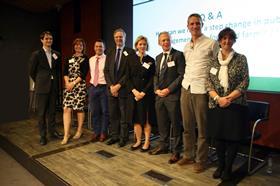
Engaging the public with the business of food and farming brings two very clear benefits. Not only does it help combat the obesity crisis by promoting increased intake of fruit and veg, but it is being hailed as a crucial method of ensuring that the food and farming industries receive their share of government attention and funding post-Brexit.
Those were some of the central messages from LEAF’s first public engagement conference, held in London last week, where speakers ranged from Sainsbury’s Beth Hart to land economy professor of the University of Exeter, Michael Winter.
The fresh produce industry has long been interested in increasing intake of fruit and vegetables, but speakers noted that this should be voiced through engaging more strongly with the health agenda. “We have a big role to play in the health sector and health debate. With the rise of food writers, there is a sense that there are lots of claims out there, so we have a duty to inform people,” said Winter. “There is a massive problem with obesity. We have to play our part in that.”
LEAF chief executive Caroline Drummond highlighted the challenge to farming and food posed by the Brexit vote: “EU budgets are in question, and unless we can convince people that what we’re doing is good, we face a real challenge,” she said. “This is not about doing more of the same, we are now on a different platform for agriculture. Farmers are multi-taskers – they’re vets, engineers, accountants, computer operators, whenever it’s needed. This is great because it means we have lots of touchpoints with the public,” she added.
Director of the New Citizenship Project, Jon Alexander, said the word ‘consumer’ itself poses a problem. “We need to stop talking about consumers. The pronoun we use to talk about consumers is ‘they’; who are 'they'?” Alexander pointed to ‘sharing economy’ business models, such as Airbnb, as responding better to the public. “Airbnb has gone from nothing to having over one million rooms. The scale of these models that treat people like members not consumers is vast – when they catch on they rocket,” he said.
Sainsbury’s head of technical, Beth Hart, agreed that shoppers now want to know more about where food has come from. “With the Morrisons milk price campaign, where they communicated this to shoppers and turned them into campaigners, this is certainly something we could learn from,” she said. “We do recognise there is more we can do, and we’re open to the challenge.”
Better engagement with the public must also come from communicating outside of the industry, according to Chris Manley of the National Federation of Young Farmers’ Clubs. “We need to keep stretching ourselves outside of the comfort zone of where we usually communicate.”
Neither Brexit nor the obesity crisis are about to be solved overnight, and engaging with the public in context of both of these issues will go a long way to securing a sustainable and profitable future for the food and farming sectors.
Public enagement in action
• Open Farm Sunday, LEAF's flagship public-facing event
• Sainsbury’s Homemade website, featuring produce and recipes
• Countryside Classroom offers 30,000 teacher users resources on farming and the environment
• Food Assembly, an online selling platform and offline food network that connects food producers directly with the public



